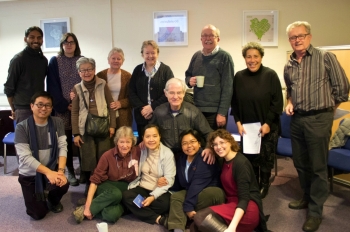JRS UK Guest Blog Post on Detention

In this guest post, Beatrice Grasso, Detention Outreach Manager for JRS UK (Jesuit Refugee Service), writes a powerful testimony about what it means to visit people in immigration detention. This article originally appeared in the JRS UK newsletter. JRS UK sends out regular postal newsletters and e-mail updates to their supporters. If you would like to receive these updates, you can subscribe on the JRS UK website.
"It is hard to imagine what it must be like to be incarcerated, to be constrained in an enclosed space for days on end, surrounded by walls and locked doors, deprived of even the simplest of choices: what to eat, when to sleep, whom to see. It is even harder to imagine what that same experience must be like when the reason for being there is the first place is unclear, and when there is no clear end in sight.
Immigration Removal Centres (IRCs), as they are officially known, are technically not prisons, but you would be forgiven the easy mistake. They certainly look like prisons, with their high walls and barbed wire fences; and they feel like prisons, with their strict regulations and regular lockdowns. Yet, most of the people who are detained there have committed no crime, and none of them know how long it will be before they are let out.
As in most other countries, this is made possible in the UK due to the existence of a system of administrative detention: this means that certain people, because of their immigration status, can be effectively imprisoned without trial, because it is expected that they will be soon returned to their country of origin. What sets the UK apart from the rest of Europe is the fact that this is the only country that does not have a statutory time limit on immigration detention. As a result, while some people will only be detained for a few months, others are detained for years before being eventually released back into the community, their detention having served no purpose at all.
Incredulity, denial, despair: these are extremely common reactions among the men JRS UK visit as part of our work of Detention Outreach in the Heathrow IRCs. Many men struggle to understand why they have been detained, certain there must have been some mistake. As the months roll by, however, that possibility seems less and less plausible, and several of them start developing increasingly negative thoughts, their physical and mental health often deteriorating noticeably.
In the bleakness of their situation, they often find very little to hold on to, as their “normal” lives outside detention fade into distant memories, family and community ties are strained to breaking point, and faith in the system is shattered. It is here that our dedicated team of volunteers attempts to bring back some light in their lives, some consolation in their despair. With a very limited range of possible actions at their disposal, volunteers do the only thing they can: be present.
Accompanying these men during one of the most difficult times in their lives is a challenging task, as our own helplessness and frustration build up, and the desire “to do something” often grows uncontrollably. In this moment, a small miracle takes place, as with great generosity our friends in detention remind us of the power of our being there. It is interesting to note this passage of Matthew’s Gospel: “I was in prison and you came to see me” (Mt 25, 36).
“It does not read: I was in prison and you helped me get out. Nor: I was in prison and you solved my immigration case. No, the only action required is a visit.”
What seems like a small, insignificant gesture in front of the suffering of captivity is actually a powerful display of love. It is showing, in deed and not only in words, that we care about this person as an individual, as a human being. It means recognising that they are not forgotten, that someone is ready to stand by them, no matter what. It gives them something to look forward to in the timeless void of detention, someone to rely on when all other reference points have disappeared. It restores some of the lost hope, theirs and ours alike, that someday the immigration detention system will be only a bad memory."
Get involved: if you feel inspired to action by Beatrice’s words, We’re recruiting now for new visitors into detention. If you’re interested and would like to learn more, please e-mail detentionuk@jrs.net




